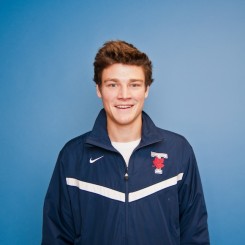Ethan Davenport couldn’t have had a better start to his pre-indoor season. The third-year Varsity Blues middle-distance runner raced to victory in the 3000 m at the Cornell Relays event in Ithaca, New York, on Dec. 3.
Already a champion in the 1000 m at the meet, Davenport decided to try his feet at the more grueling 3000 m.
 Davenport surged past a competitor on the final straight, powering through the finish line in 8:33.88 and edging the second-place runner by 0.02 of a second.
Davenport surged past a competitor on the final straight, powering through the finish line in 8:33.88 and edging the second-place runner by 0.02 of a second.
The Cornell meet was Davenport’s first step onto the indoor track this season.
Although his specialties are the 4×800 m relay, 1000 m, and 1500 m, Davenport has shone in the 3000 m field in the past, ranking second in his first year and fifth in his second year at Cornell.
“When [Ethan] was in first year, he was our top guy at this race. He’s come a long way since then [and] he’s not far off the CIS level,” said coach Ross Ristuccia.
“He’s a very talented kid [and] he’s also a really good competitor. He’s a hands-off kind of athlete [and] he doesn’t need a lot of attention to do well.”
But winning is secondary to Davenport. “The most important thing [about the sport is] how natural [it] is; it’s the most natural movement for a human being, more natural than walking.
“It works to help all other aspects of your life. The mentality you develop to manage training works [for] academics [and] how you treat people. What so many people think of as a chore to stay healthy really opens so many doors to so many different parts of your life.”
Competition does matter. “You always want to line up for a race thinking that you can win it, and that was a goal going [into the race],” admitted Davenport. “I wanted to be competitive — wherever that put me, whether I was in first or fourth or fifth.”
Mental strength is just as important as physical strength in running. “There [are] thousands of decisions that you make in a race that can affect the outcome,” says Davenport.
“As soon as you start to listen to even a whisper of your mind, you’re going to start to slow down, you’re going to miss a step, you’re going to fall off track, you’re not going to follow the same guy, you’re going to let someone pass you, and it’s a big deal.”
The 3000 m in particular is a debilitating race — 15 laps around a 200 m track, at a pace of 34–36 seconds a lap. So it’s no surprise that fatigue inevitably takes its toll on every athlete, even on elite runners like Davenport.
“When you go around [the track] and see 14 laps [on the lap counter], and then you go around two more times and see 12 laps and 11 laps, that’s very discouraging.”
Crippling thoughts started to stream in halfway through Davenport’s race.
“Am I dying here, maybe this isn’t [my] day, [do] I [look] okay, maybe I’m just going to run an average [time], I’m going to get stuck in this pace and it will be a bad race,” Davenport remembers thinking.
But with three laps to go, Davenport slowly began to pick people off.
“I ran a tactically smart race. Basically the most important thing that I did was not [to] make any significant moves until I knew that I was ready to make them,” he explains. “In the middle of the race, I wasn’t jostling, passing guys, getting passed, and then passing them again, because all those little bursts are going to cost you in the end.”
Davenport was sitting between sixth and eighth place for most of the race, only pulling in front with his very last strides.
“Everything was going into every step and I knew [that] it might fall short. I was really falling into the line, and did everything I could in a span of time when I realized [that my competitor] was in [first-place],” Daveport remembers. “It’s pretty cool how you can make up so much ground if you really put everything into it.”
Teammates Jake Woloshyn, Zain Ahmed, and Antun Pavelic crossed the finish line in fourth, eighth, and ninth, respectively.
The U of T track team is getting fired up for their indoor season.
“The main goal is to be as fast as I can be for the 4×800 m relay. We have a very strong team with a lot of depth, and we want to all come together at the right time and see if we can grab a medal in Canada,” Davenport explained.
While the 3000 m at the OUA and CIS championships is a possibility, training programs for short and long distances are different. Davenport hopes to qualify in either the 1000 m or 1500 m events.
It won’t be easy, but that won’t make any difference to Davenport.

